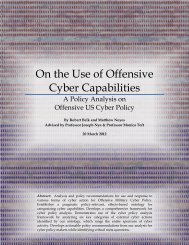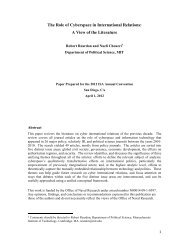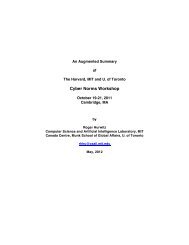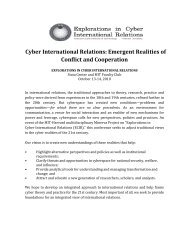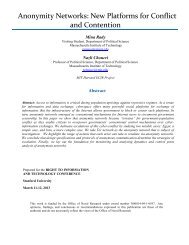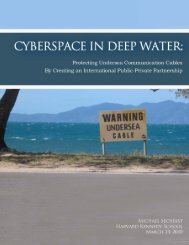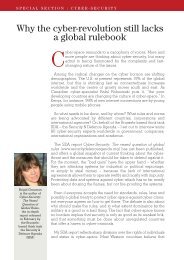Stewardship of Cyberspace: Duties for Internet Service Providers
Stewardship of Cyberspace: Duties for Internet Service Providers
Stewardship of Cyberspace: Duties for Internet Service Providers
Create successful ePaper yourself
Turn your PDF publications into a flip-book with our unique Google optimized e-Paper software.
HATHAWAY/SAVAGE: <strong>Stewardship</strong> <strong>of</strong> <strong>Cyberspace</strong>: <strong>Duties</strong> <strong>for</strong> <strong>Internet</strong> <strong>Service</strong> <strong>Providers</strong> 15<br />
ISPs represent nearly 87 percent <strong>of</strong> the total<br />
market (service) in <strong>for</strong>ty nations. 51 They also rec-<br />
ognize that peer pressure among the ISPs is an<br />
important incentive that contributes to security<br />
and opting in to an overall program.<br />
In Japan, more than seventy <strong>Internet</strong> service<br />
providers, representing 90 percent <strong>of</strong> the cus-<br />
tomer base, have assumed the duty to in<strong>for</strong>m<br />
their customers <strong>of</strong> infections. ISPs notify con-<br />
sumers if their machines appear to be part <strong>of</strong> a<br />
botnet infection and <strong>of</strong>fer government-funded<br />
tools <strong>of</strong>fered through Cyber Clean Center (CCC)<br />
to clean the computers. 52 This voluntary pro-<br />
gram has shown remarkable reduction <strong>of</strong> infec-<br />
tion rates. From 2007 to 2011, ISPs have reduced<br />
the rate <strong>of</strong> botnet infection from about 2.5 per-<br />
cent <strong>of</strong> personal computers to just 0.6 percent. 53<br />
In the Netherlands, Dutch ISPs signed an anti-<br />
botnet pact and jointly launched an initiative to<br />
fight malware-infected computers and botnets.<br />
The ef<strong>for</strong>t involves fourteen ISPs and represents<br />
98 percent <strong>of</strong> the consumer market. ISPs are<br />
sharing in<strong>for</strong>mation to obtain better coverage<br />
and reduce response times. They have accepted<br />
the responsibility to notify their victimized users<br />
and quarantine the infections until assistance<br />
can be provided. 54<br />
In Germany, the German Federal Office <strong>for</strong><br />
In<strong>for</strong>mation Security (BSI) has mandated that its<br />
51 “The Role <strong>of</strong> <strong>Internet</strong> <strong>Service</strong> <strong>Providers</strong> in Botnet Mitigation:<br />
An Emperical Analysis based on Spam Data.” STI Working<br />
Paper, May 2010, Organisation <strong>for</strong> Economic Co-operation and<br />
Development, Directorate <strong>for</strong> Science Technology and Industry,<br />
12-Nov-2010, p. 41.<br />
52 “Botnets: Detection, Measurement, Disinfection and Defence,”<br />
European Network and In<strong>for</strong>mation Security Agency (ENISA),<br />
2011, p. 98.<br />
53 Joseph Menn, “US Starts to Tackle Hacking Curse,” Financial<br />
Times, 12 October 2011.<br />
54 Gadi Evron, “Dutch ISPs Sign Anti-Botnet Treaty,” Dark Reading,<br />
29 September 2009, http://www.darkreading.com/<br />
blog/227700601/dutch-isps-sign-anti-botnet-treaty.html.<br />
ISPs track down infected machines and provide<br />
advice to users on how to clean their comput-<br />
ers. 55 Telefonica has taken this initiative further.<br />
It recently launched customer protection insur-<br />
ance against online fraud at a cost <strong>of</strong> five euro<br />
per month. “The customer and up to six family<br />
members are covered against data misuse,<br />
fraudulent online payment practices and theft or<br />
damage <strong>of</strong> the Telefonica Germany DSL router,<br />
modem or surf stick. Telefonica claims to be the<br />
first network operator to <strong>of</strong>fer a customer pro-<br />
tection insurance.” 56<br />
And in the United States, Comcast is a market<br />
leader and early adopter <strong>of</strong> the duty to in<strong>for</strong>m<br />
and protect its customers. Through its service<br />
known as Constant Guard, Comcast proactively<br />
contacts its customers via an email “service<br />
notice” if Comcast believes one or more <strong>of</strong> its<br />
customers’ computers is infected with malicious<br />
s<strong>of</strong>tware (e.g., it is a bot). Comcast’s ef<strong>for</strong>ts in<br />
this regard have received the attention <strong>of</strong> the<br />
Federal Communications Commission (FCC).<br />
<strong>Service</strong> providers, network operators, and<br />
equipment suppliers are working together as<br />
part <strong>of</strong> the FCC’s Communications Security,<br />
Reliability and Interoperability Council (CSRIC)<br />
to propose a set <strong>of</strong> agreed-upon voluntary prac-<br />
tices that would constitute the framework <strong>for</strong> an<br />
opt-in implementation model <strong>for</strong> ISPs to conduct<br />
botnet remediation. 57 This initiative is modelled<br />
after the Australian iCODE Project and, if widely<br />
adopted in the United States, could make a sig-<br />
55 John Leyden, “German ISPs Team up with Gov Agency to Clean<br />
up Malware,” The Register, 9 December 2009.<br />
56 “Telefonica Germany Offers <strong>Internet</strong> Insurance,” Telecom Paper,<br />
9 February 2012, http://www.telecompaper.com/news/telefonica-germany-<strong>of</strong>fers-internet-insurance.<br />
57 CSRIC’s mission is to provide recommendations to the FCC to<br />
ensure, among other things, optimal security and reliability <strong>of</strong><br />
communications systems, including telecommunications, media,<br />
and public safety.



